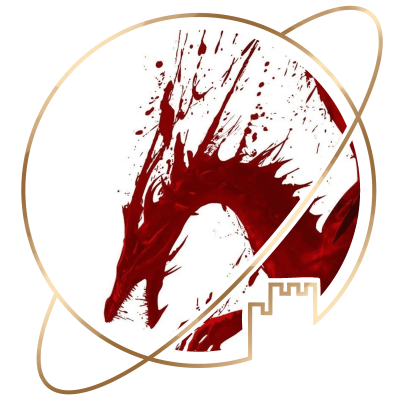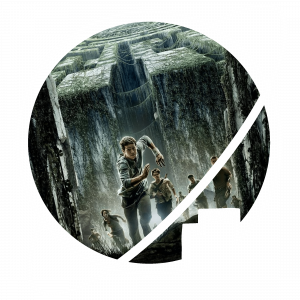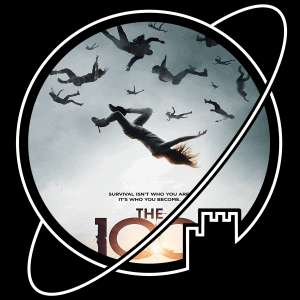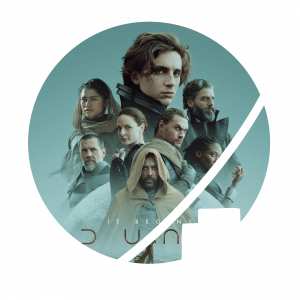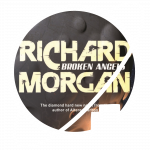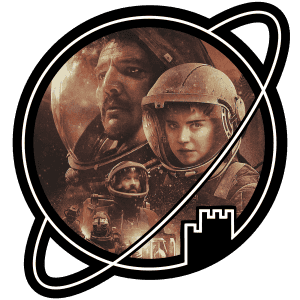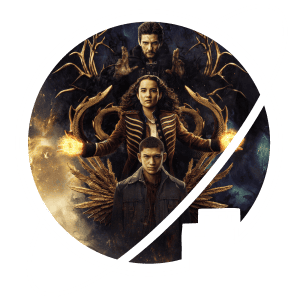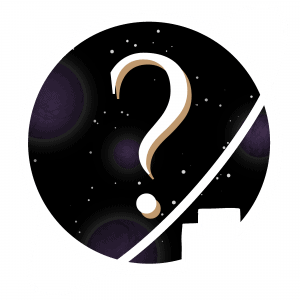Welcome to the Escape Velocity Collection!
We are an opinionated group of friends reviewing all sorts of fantasy and science fiction media. Don’t forget to get to know the curators and visit our curated Collection, where we discuss the stories that never cease to transport us to another world.
Will you escape with us?
LATEST POSTS:
I made (most of) this playlist years ago. There’s nothing quite like having playlists that remind you of a piece of media that you enjoyed so much that you really don’t want to leave its world.
This playlist is mostly inspired by my personal playthroughs of Dragon Age: Inquisition, in which I made choices that may differ from other players. Wanna know what choices I made? Why not listen to find out?
Find the whole playlist on Spotify:
Check out our other posts about Dragon Age here:
1 - I am the One - Raney Shockne, Elizaveta, Nick Stoubis
With the huge amount of stunning tavern songs that are actually part of the game, it would be a crime not to include at least one. This song in particular is a huge favourite of mine, as its melody strongly references the theme of Dragon Age: Origins.
2 - Everything Changed - Lindsay Lou
This one is pretty self-explanatory. Everything changed for the Inquisitor when she stepped out of the fade.
3 - Take the Journey - Molly Tuttle
After spending most of her life locked away in the Ostwick Tower of Magi, the Inquisitor is suddenly thrust into a life of constant travel.
4 - U-turn - Tegan and Sara
From the first moment I heard this song, it reminded me of Cassandra Pentaghast. Never have I ever seen a U-turn like the one she makes when she goes from suspecting our protagonist of killing the Devine, to believing you were sent to Thedas by the Maker himself.
5 - Little Lion Man - Mumford and Sons
This one is… pretty obvious. I’m very basic and obviously romanced Cullen, and there is really only one song you can pick for the Lion of Ferelden
6 - Somebody Special - Nina Nesbitt
I like to imagine the inquisitor has a pretty serious case of imposter syndrome. It can’t be easy being a circle mage, and suddenly people think she’s this big deal. Could she be somebody special?
7 - The Other Side - MAX, Ty Dolla $ign
I’m not a huge fan of the Greatest Showman, but this song is a perfect depiction of the Inquisitor convincing people to join her cause. Especially Vivienne.
8 - Hero is My Middle Name - Ethan Slater, Danny Skinner, Lilli Cooper (Spongebob the Musical)
Spongebob the Musical slaps.
9 - You Need To Calm Down - Taylor Swift
God, Corypheus just needs to… chill. You know?
10 - Along the Road - Karmin
Endings suck, but it’s always better to have happy memories than to have no memories at all.
11 - I Lived - OneRepublic
This is starting to get real dramatic. She’s fine, she’s just been through a lot.
12 - Spirits - The Strumbellas
In didn’t want to include a song for every companion, but couldn’t help ending the playlist with this little ode to Solas. He sucks and I don’t like him.
Reviewed by:
- Video game developed by Bioware
- Released in 2009
- Platforms: Microsoft Windows Xbox 360 PlayStation 3 Mac OS X
Forced by circumstances to leave your old life behind, you join the ranks of the Grey Wardens, an ancient order sworn to protect the world against the murderous Darkspawn. Though the fate of the whole continent lies in the balance, you’re the people’s only hope to stop their imminent advance. However, you’ll have to navigate the politics of several factions and explore dangerous locations to stand a chance. Shall you succeed?

I was under 16 years old when a friend first showed me bits and pieces of Dragon Age: Origins. I played through some parts without any knowledge of the overarching plot and the specifics of the world. However, I remember I was deeply impressed by the extensive lore and the elements of choice. When he eventually also showed me the (then newly released) Dragon Age II, it only took me a short time to come to a proactive decision. One day, I collected my saved pocket money, and after school I went to the game store to buy Dragon Age: Origins, Dragon Age: Awakening and Dragon Age II (all physical copies, because that’s how it used to be back then). I will always remember that day. Why? Because, strictly speaking, legally I wasn’t old enough to actually buy these games at the time (I was 16 instead of the required 18). However, the salesperson apparently couldn’t care less and never asked for an ID. I’ll forever be grateful for that negligence, though, for I played all the games in direct succession, and I’ve been hooked to Dragon Age ever since.
There were many elements I was blown away by when I played ‘Origins’ in those years. The most impressive to me was the great extent to which the world and characters reacted to the choices my character made, starting with your gender and origins (the unique character backgrounds for which the game is named after, each unlocking an alternative playable start of the game). It was my first real experience with roleplaying and the possibilities rocked me to my core. Another element that truly amazed me were the relationships you could build with your travel companions. In a similar way, the now famous Bioware romances of course had a profound attraction to me. I would blame my teenage years for this, but experience has shown I’m still very much vulnerable to their charms.
Although the plot is at its core a traditional story about a hero gathering allies to fight evil, there are enough twists and turns and interesting dilemmas along the way to spice things up. Depending on the choices you make, your character might not even be a true hero. In that regard, Origins is not afraid to take common tropes and spin them completely around, something that’s also apparent in the unique worldbuilding. This leaves the game with an – at times very dark – enthralling atmosphere.
Dragon Age: Origins is a relatively old game now. The graphics will not impress anyone (though it seems there are some magnificent fan-made mods out there that solve this somewhat) and the game mechanics can be quite clunky. Furthermore, though Origins was quite progressive for its time when it came to societal values, the game does not meet the standards that exist today. For me, all this doesn’t take away from its charm, but take this disclaimer as you will.
Out of all the Dragon Age games, I’ve replayed Origins the most times with very different characters and choices. Still, I have yet to see everything this wonderful game has to offer. In conclusion, I can’t wait to plunge myself into this game once again.

I’m sorry about the rating folks, please let me explain before you lynch me!
Video games have a nasty habit of aging poorly: especially high fidelity graphics are superseded quickly, game mechanics and controls are enhanced over many iterations, and overall user experience is improved. As time passes, most games simply lose relevance.
There are exceptions, of course (I can think of a number of examples in the RTS genre), but I find that often, games that are more than a few years old are only worth playing for nostalgia (which requires having played the game before), or because of some unique gameplay or niche mechanic. Indie games tend to score better in those last departments than triple-A titles.
So where does Dragon Age: Origins sit? The game was released over ten years ago. In all honesty, I simply wouldn’t be writing this review if it weren’t for my [conversation] with Jop – because I think that Dragon Age is sadly one of those games that is no longer relevant for the modern market – superseded by more recent iterations of similar games (not in the least the later instalments of the same franchise).
Would I have been reviewing this when I first played it, Dragon Age: Origins would merit a solid 3.5 or 4-star rating. I loved being able to make choices, the world looked really cool and the character progression was satisfying. But in 2021? I would cut that rating in half. Not because the game was bad in hindsight, but because I see little reason to play it today. Of course, the story still stands, and there are still lots of lovely little details – for example, the roleplay-heavy origin stories and the random conversations between the NPCs in your party. But overall, I don’t think the game aged well enough to merit a playthrough for new players without warm memories of first picking it up in 2009. The graphics and play areas really show their age. ‘Open’ world areas like forests are really little more than corridors, rocks are textured blobs, every tree the size of a giant sequoia, some cities little more than a sparsely populated square. The gameplay (especially combat) is a slow and indecisive mix between the third-person action RPG it is presented as and the isometric, top down tactical RPG Baldur’s Gate which Dragon Age claimed to be a successor of. The world building is decent but not particularly original, and not a reason in itself to play the game. It also isn’t a game that you can blast through in a couple of evenings to get what all the fuzz used to be about: I’m guessing a full playthrough takes around 50 hours.
In short: Dragon Age: Origins is a game that used to be good, but that time caught up with.

I strongly disagree with Peter on this one. Let me explain. Dragon Age: Origins is the first proper video game I played from beginning to end. Ironically, I played it at Peter’s place.
Sure, Dragon Age is old. Lots of good things are old. And while I agree that the graphics are kind of dated, there’s plenty there to make up for that. The characters are fun, the setting is well-developed and unique enough to set it apart from other fantasy settings (although it is in many ways a pretty basic fantasy world). The music is beautiful and haunting. The story is classic but just extremely well done.
Not to be a huge stereotype, but I was instantly hooked on this game the moment I realised I could flirt with people. I’m not a particularly huge fan of romance as a genre, but I love romance in video games.
I think what I like most about Dragon Age is how real it feels. Yes, you matter to the story because you are the one who has to save the world. However, even if you weren’t the main character, you would still matter to the friends you make in the game. Those little touches, like the option to romance characters and have long conversations with others about their lives are what make this game so good. It’s the full experience of being part of a fantasy world.
Tagged:
- Movie directed by Wes Ball
- Based on The Maze Runner by James Dashner
- Starring Dylan O'Brien, Ki Hong Lee, Kaya Scodelario, Thomas Brodie-Sangster, Rosa Salazar, Giancarlo Esposito, Aidan Gillen, Patricia Clarkson
- Released in 2015
- Runtime: 131 minutes
- Part two of a trilogy
Thomas, Teresa and the other ‘Gladers’ have escaped the Maze, only to find that the outside world is a post-apocalyptic wasteland. While it at first seems they’ve finally reached some safety, they soon discover things might not be as ideal as they hoped. Their running days are not yet over…
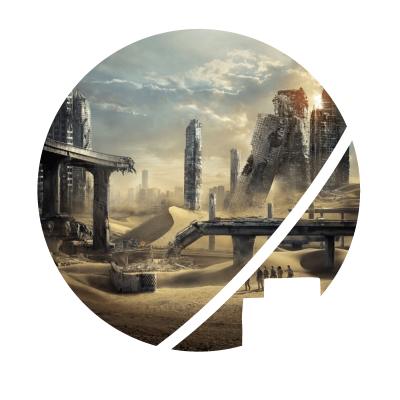

Where I thought that the other installments of this trilogy couldn’t possibly possess such a meandering plot as The Maze Runner, this movie proved me wrong. Thomas and his merry band of friends go from pillar to post, throwing themselves at avoidable problems to pave the way for thrilling action scenes. Once again, it works, if you’re not too nitpicky. I was entertained, at least.
I wish I could say that I grew closer to the characters this time, but that wasn’t quite the case. However, the cast is complemented with a few new characters with potential, including a new female character. In addition, towards the end of the movie, some characters go through some interesting developments.
Unfortunately for me, one of the new cast additions is a dubious creep played by Aidan Gillen. Although I recognize he’s an excellent actor, I must admit I’m seldom pleased to see his face (Game of Thrones’ Littlefinger ruined that for me). Sorry Aidan…
On the whole, I was somewhat disappointed that the concept of this series had moved away from giant mazes and the like. The answers that are provided to give the first film context seemed somewhat underwhelming to me. Great movie for an evening that doesn’t require any thought-provoking exercises, though.
Tagged:
Hi all, and welcome to our monthly update for November 2021!
Each month, one of our curators looks back at what they’ve been up to over the past weeks and what we can (hopefully) expect from them in the not-too-distant future.
This month, Peter will take you through his experiences in the speculative genre over the past month. Curious what models are on his painting station or what books are on his night stand?
Read on!

Past month
In a shocking turn of events that absolutely no-one saw coming, my job as an attorney at a large commercial law firm has kept me off the streets (and off my hobbies) far more than I woul’d’ve liked.
Even when squeezed for time, however, I have found a few moments to dive into worlds that don’t exist except in your imagination.
Of last month’s post, I want to highlight Denis Villeneuve’s Dune (one more time!)
I went to see it in the cinema again, this time with my parents, and even though it was the fourth time, it still didn’t disappoint – if you still have the chance to go see it on the big screen, get out there and do it, this movie is made for it.
Upcoming
As I said, I haven’t had all the time I would’ve liked – but below are some of my exploits over the past month. Reviews are hopefully on the horizon, but we all know how life gets in the way sometimes…
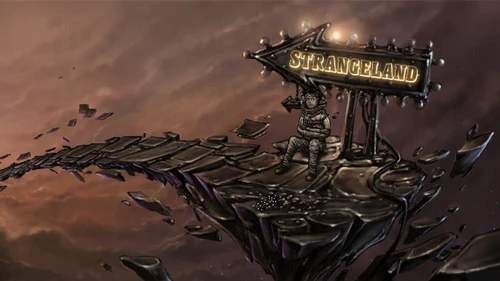
I finished Strangeland, a point-and-click creepy circus horror game by Wormwood Studios – the same folks that made Primordia, one of my favourite games.
I’ll be uploading my review of Strangeland ASAP, but in the meantime, if you haven’t played Primordia yet… what are you doing with your life?
I wanted to take a picture of the models on my work station, and then I realised it is an absolute mess. This always happens while in the middle of a painting project. I’m currently working on Théoden’s doorwardens – a number of unnamed Rohan Royal Guard, as well as Háma and Gamling. I’m especially happy to finally be painting the mounted version of Gamling (easily the best sculpt of the bunch). I know he doesn’t have his banner with him, but then I like my friends to keep playing with me.
(yes, it’s that powerful in game)
I’ll post a picture on our socials once the squad’s all done!
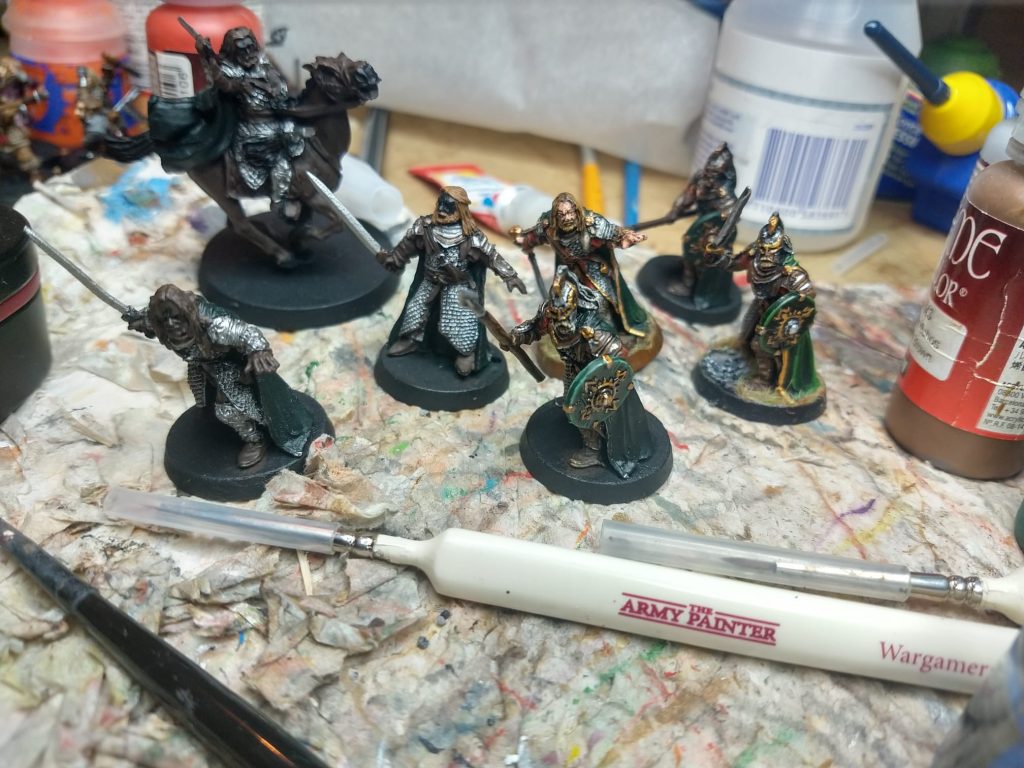
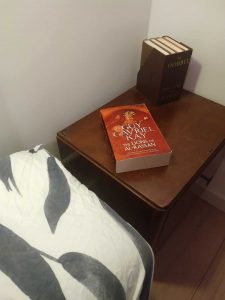
You might remember my posts about Guy Gavriel Kay’s The Lions of Al-Rassan from Andalusia – I still haven’t managed to finish it (I’m nearly there, really!).
Disclaimer: it’s my job’s fault, not the book’s.
You’ll get a review as soon as I manage to find the time!
I’m listening to Ursula le Guin’s The Left Hand of Darkness (finally!), and while it’s not bad, I feel the book doesn’t quite manage to live up to it’s hype yet. Perhaps the audiobook doesn’t quite do it justice – maybe I’ll be putting this one aside to read on paper at a later date?
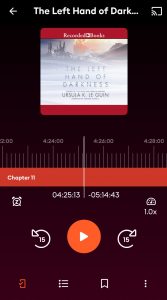
That’s it for this month folks!
Have you played Primordia yet? Do you like to stomp your friends with an optimised Riders of Théoden-list in GW’s Middle Earth Strategy Battle Game? Should I be reading The Left Hand of Darkness on paper? What have you been up to over the past month?
Let us know on our socials!
- Book written by Richard Morgan
- Published 28 February 2002
- Part one in the Takeshi Kovacs trilogy
In a violent cyberpunk future in which your consciousness can be downloaded into a machine in your neck and bodies have become interchangeable, Takeshi Kovacs wakes up in prison on Earth, far away from his home on Harlan’s World, sleeved in a new body. He is released to solve the murder of Laurens Bancroft, a man rich enough to have survived his own death.
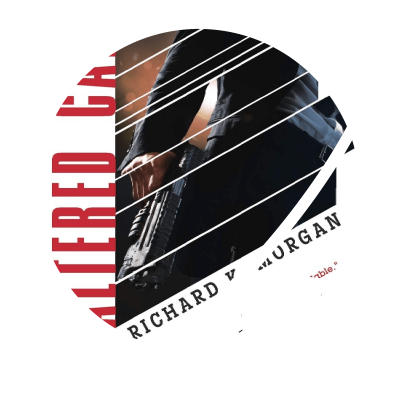

In my review of Netflix’ adaptation of this book, I admitted to the sin of (accidentally) having watched it before I read the book. It’s a thing I seldom do, and it makes for an interesting perspective. I have updated my review of the series with a few lines to reflect how my opinion has changed after finally having read the book as well.
Moving on to the book proper, I must first of all repeat that Altered Carbon has a really interesting premise: in the not too distant future, humanity has figured out a way to convert the human mind into data, which is stored in a little device in the neck. Upon the death of one’s body, the machine, or stack, can be retrieved and the mind reinserted into a new body (called a ‘sleeve’). Morgan uses this relatively simple innovation to great effect: Not only has he created a biotech-Cyberpunk setting that feels surprisingly fresh despite leaning (heavily) into some of the genre’s clichés, he also makes the premise a pivotal part of the novel’s plot and the background of each of the characters you meet, making you consider what such a (bio)technological development could mean for people from all walks of life.
Beyond the intriguing setting, the book is actually a classic whodunnit, with an anti-hero detective who teams up with sharp edged policewoman to solve the murder of one of the world’s richest men. Here, too, the book does not shy away from using the classic tropes to populate the pages, harkening back to the likes of noir detective stories. Dissected like this, the book appears to lose some of its shine – but I do want to stress that the cyberpunk setting and detective story mash together really well.
I think Altered Carbon is definitely worth a read. I’m not rating the book higher than I do, because while I realise that he is supposed to be really badass, the main character never quite clicked for me. Perhaps he’s just a bit unoriginal, perhaps the drinking, smoking, somewhat nihilist remorseless killer is just not quite my type of guy. Perhaps it is just that I have never felt particularly attracted to crime or gangster stories. Spending as much time with him as you do, I felt Takeshi Kovacs started to grate on me a little by the end of the book.
Overall though, the setting really makes this book shine. Even if the plot (or even the characters) were not my favourite, I really enjoyed the way in which Morgan keeps throwing well thought-out curveballs at you on the basis of his excellent premise. If you’re interested in original cyberpunk settings, detective stories, or biotech sci-fi (and you don’t mind blood splattering off the pages), I’m sure you’ll enjoy Altered Carbon.
A final note to those who’ve already watched the show: should you read the book? Honestly, you’ve seen most of it; there’s some discrepancies, but the setting is well converted, and most of the main plot beats are the same. You did miss out on my favourite character from the book though: if you do pick it up, look out for Trepp!
Tagged:
- Card game designed by Don Eskridge
- Artwork by Luis Francisco & Weberson Santiago
- Published by Indie Boards & Cards
- Released in 2021
- 4-10 players
- Playing time: 30 minutes
Quest is a social deduction card game set at the court of King Arthur. Players are divided into two teams: the loyal servants of Arthur and the evil minions of his foe Mordred. The good guys try to get three victorious ‘quests’ to win the game, and the bad guys try to prevent that. A quest is successful when all participating players play a ‘success’ card. When there is at least one ‘fail’-card, the quest fails. Players constantly try convince, bluff and deceit the others that they are, truly, of good will.
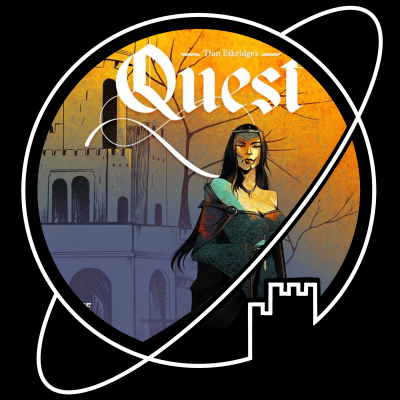

Quest is a spiritual successor of the games The Resistance and Avalon from creator Don Eskridge. The Resistance and Avalon are essentially the same game with a different flavor – Resistance is vaguely cyberpunkish in theme while Avalon is Arthurian legend – and a few tweaks. Quest improves (slightly) upon its forebears, but in its core it is very much the same game.
I had played The Resistance before and remembered it as a fun, simple social deduction game. It was a bit slow, because every round players had to vote on the team that would play the success/fail cards. Quest runs a bit more smoothly, because the round leader decides on the teams without voting. I think it is a good adjustment for the flow of the game, although I did like the team-voting as something original and extra tactical.
Some other changes in comparison to the earlier games: you can play with minimum 4 instead of 5 players (yay!); with a magic token the round leader can force a character to play a success card, although Morgana herself (one player) can ignore the token (nice double twist potential); the round leader chooses the next leader instead of passing it on clockwise (yay!); players can only be round leader once; and finally: the Final Quest. If the Evil team manages to win 3 quests before the Good team does, the Good team has a chance to name all Evil characters and still win the game. It is a crazy, all-or-nothing rule that I normally don’t endorse, but in this game it works brilliantly. Tensions rise, everyone tries one last time to present their theory and the fate of the world, the game and – perhaps most of all – your friendship hangs in the balance.
I liked the game. It is basic, but it works. It does not need much more. It is no magical sword in a mysterious stone. But it is good.
Tagged:
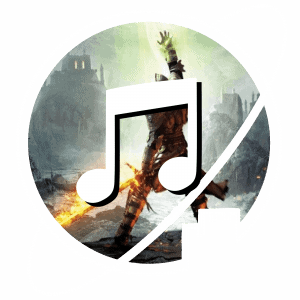
Playlist – The Inquisitor from Dragon Age Inquisition
Need something new to listen to? Why not try this playlist inspired by The Inquisitor from Dragon Age Origins, curated by Lotte?
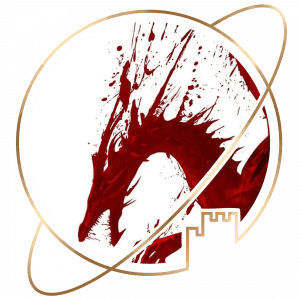
Review: Dragon Age: Origins – Bioware
Forced by circumstances to leave your old life behind, you join the Grey Wardens, an ancient order sworn to protect the world against the murderous Darkspawn. You’re the people’s only hope to stop their imminent advance. Shall you succeed?
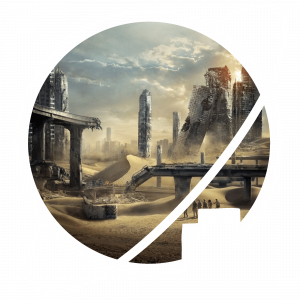
Review: Maze Runner: The Scorch Trials – 20th Century Fox
Thomas, Teresa and the other ‘Gladers’ have escaped the Maze, only to find that the outside world is a post-apocalyptic wasteland. Their running days are not yet over…

November 2021 Update – Peter
Peter’s monthly update for November 2021!
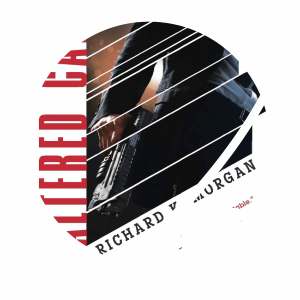
Review: Altered Carbon – Richard Morgan
In a future in which your consciousness can be downloaded into a machine in your neck Takeshi Kovacs wakes up in prison on Earth, far away from home on Harlan’s World, sleeved in a new body, to solve the murder of a man rich enough to have survived his own death.
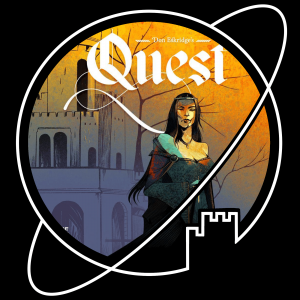
Review: Quest – Indie Boards & Cards
Reviewed by: Card game designed by Don Eskridge Artwork by Luis Francisco & Weberson Santiago Published by Indie Boards & Cards Released in 2021 4-10 players Playing time: 30 minutes Quest is a social deduction card game set at the court of King Arthur. Players are divided into two teams: the loyal servants of Arthur and the evil minions of his foe Mordred. The good guys try to get three victorious ‘quests’ to win the game, and the bad guys try to prevent that. A quest is successful when all participating players play a ‘success’ card. When there is at least one ‘fail’-card, the quest fails. Players constantly try convince, bluff and deceit the others that they are, truly, of good will. Key – ★★★½ Quest is a spiritual successor of the games The Resistance and Avalon from creator Don Eskridge. The Resistance and Avalon are essentially the same game with a different flavor – Resistance is vaguely cyberpunkish in theme while Avalon is Arthurian legend – and a few tweaks. Quest improves (slightly) upon its forebears, but in its core it is very much the same game. I had played The Resistance before and remembered it as a fun, simple social deduction game. It was a bit slow, because every round players had to vote on the team that would play the success/fail cards. Quest runs a bit more smoothly, because the round leader decides on the teams without voting. I think it is a good adjustment for the flow of the game, although I did like the team-voting as something original and extra tactical. Some other changes in comparison to the earlier games: you can play with minimum 4 instead of 5 players (yay!); with a magic token the round leader can force a character to play a success card, although Morgana herself (one player) can ignore the token (nice double twist potential); the round leader chooses the next leader instead of passing it on clockwise (yay!); players can only be round leader once; and finally: the Final Quest. If the Evil team manages to win 3 quests before the Good team does, the Good team has a chance to name all Evil characters and still win the game. It is a crazy, all-or-nothing rule that I normally don’t endorse, but in this game it works brilliantly. Tensions rise, everyone tries one last time to present their theory and the fate of the world, the game and – perhaps most of all – your friendship hangs in the balance. I liked the game. It is basic, but it works. It does not need much more. It is no magical sword in a mysterious stone. But it is good. See also: Tagged:










